Accommodation Services in the Hospitality Sector: A Detailed Report
VerifiedAdded on 2022/11/25
|12
|1201
|135
Report
AI Summary
This report provides a comprehensive overview of accommodation services within the hospitality industry. It begins with an introduction to the hospitality sector and defines the scale and size of accommodation services, differentiating between commercial and non-commercial businesses. The report then explores various forms of ownership in the accommodation sector, using examples to illustrate each model. It also analyzes the roles of grading and classification systems, as well as the impact of online review sites on potential guests' decisions. The report highlights the importance of providing excellent service to maintain goodwill, attract customers, and maximize profitability. The report uses Marriott International as a case study to illustrate key concepts such as the scale of its operations and the impact of ownership models. The report concludes by emphasizing the increasing significance of the hospitality industry and the need for hotels to focus on meeting customer demands to achieve success. References to academic literature are included to support the analysis.
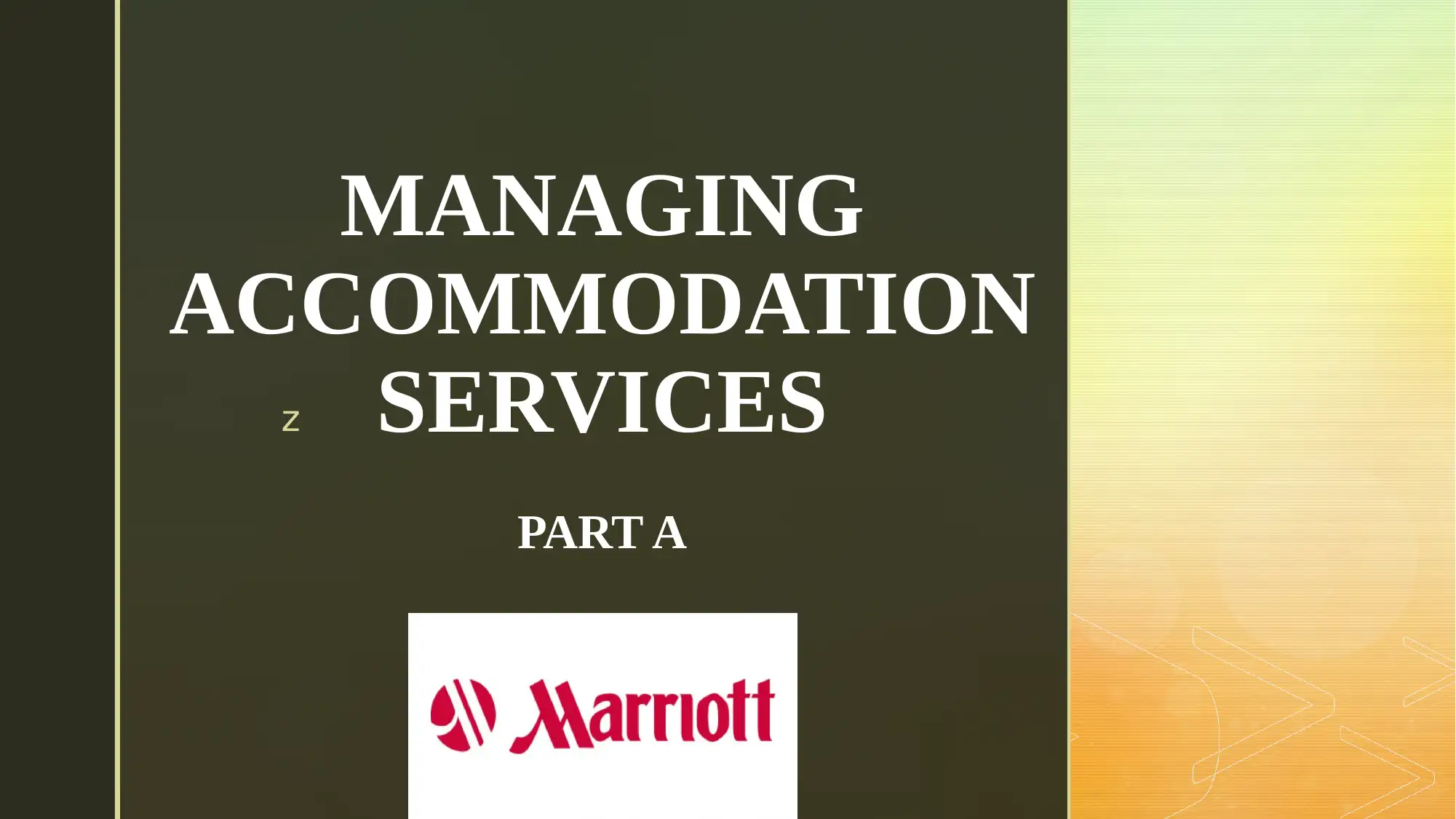
z
MANAGING
ACCOMMODATION
SERVICES
PART A
MANAGING
ACCOMMODATION
SERVICES
PART A
Paraphrase This Document
Need a fresh take? Get an instant paraphrase of this document with our AI Paraphraser
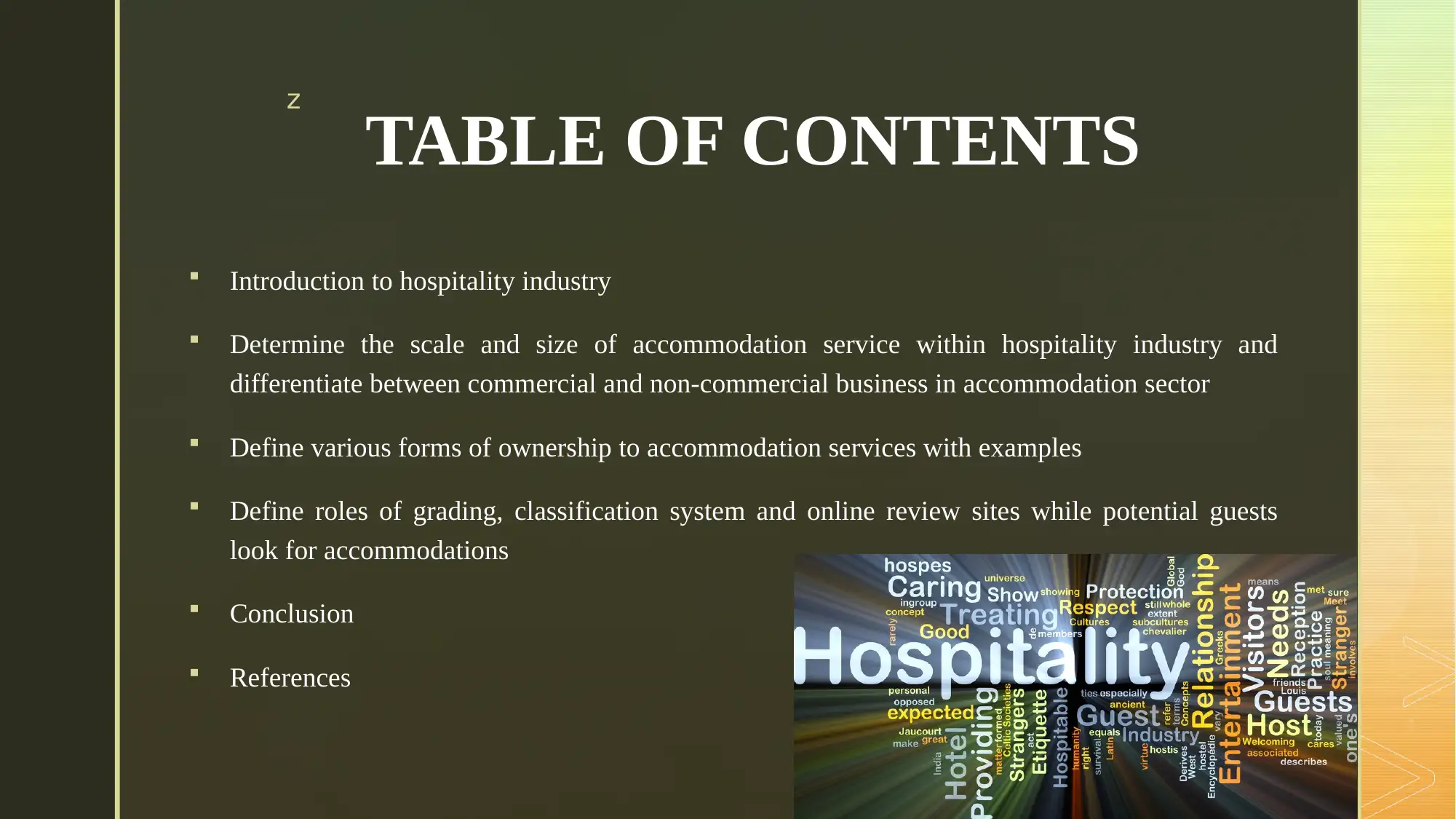
z
TABLE OF CONTENTS
Introduction to hospitality industry
Determine the scale and size of accommodation service within hospitality industry and
differentiate between commercial and non-commercial business in accommodation sector
Define various forms of ownership to accommodation services with examples
Define roles of grading, classification system and online review sites while potential guests
look for accommodations
Conclusion
References
TABLE OF CONTENTS
Introduction to hospitality industry
Determine the scale and size of accommodation service within hospitality industry and
differentiate between commercial and non-commercial business in accommodation sector
Define various forms of ownership to accommodation services with examples
Define roles of grading, classification system and online review sites while potential guests
look for accommodations
Conclusion
References
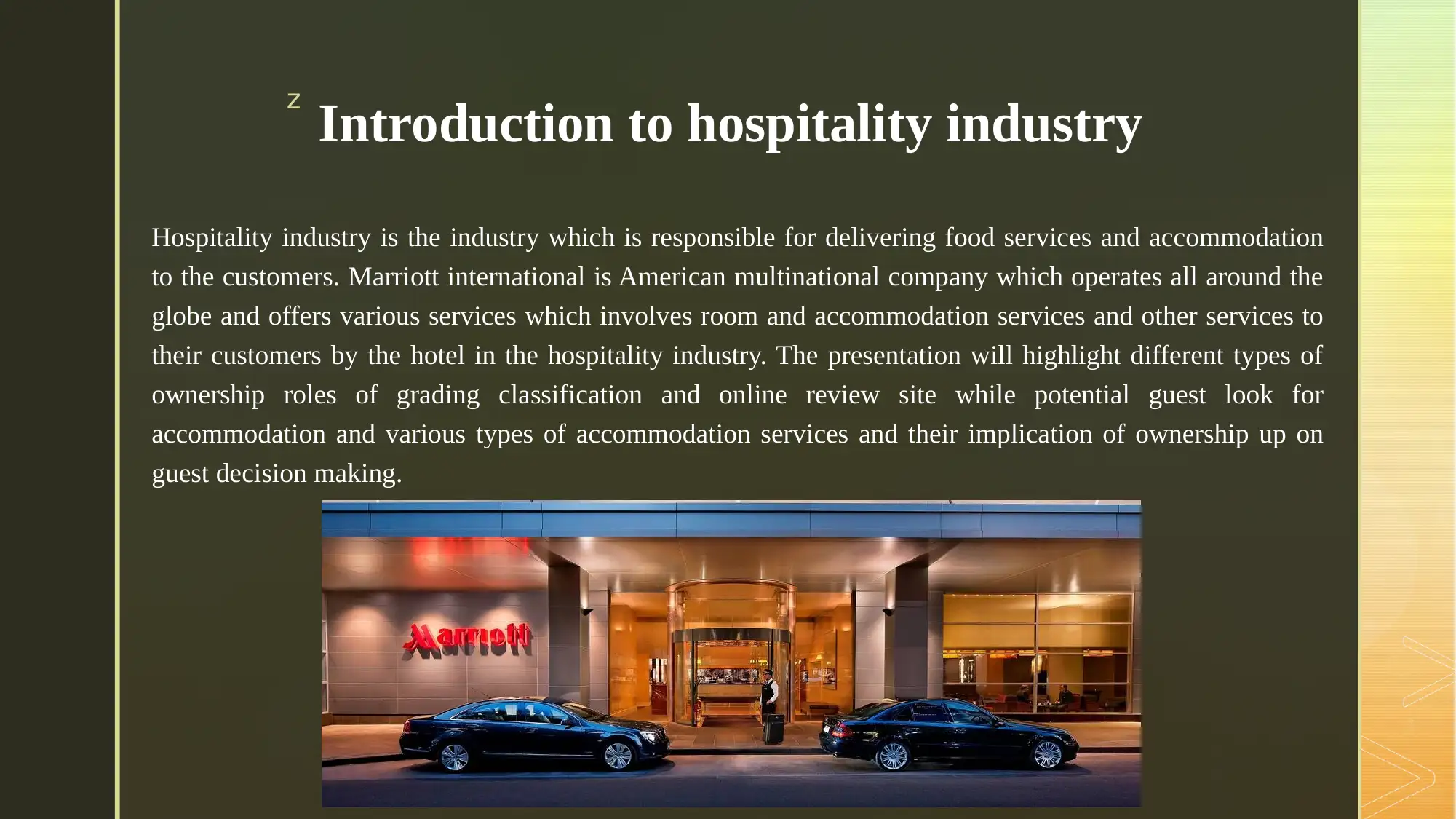
z
Introduction to hospitality industry
Hospitality industry is the industry which is responsible for delivering food services and accommodation
to the customers. Marriott international is American multinational company which operates all around the
globe and offers various services which involves room and accommodation services and other services to
their customers by the hotel in the hospitality industry. The presentation will highlight different types of
ownership roles of grading classification and online review site while potential guest look for
accommodation and various types of accommodation services and their implication of ownership up on
guest decision making.
Introduction to hospitality industry
Hospitality industry is the industry which is responsible for delivering food services and accommodation
to the customers. Marriott international is American multinational company which operates all around the
globe and offers various services which involves room and accommodation services and other services to
their customers by the hotel in the hospitality industry. The presentation will highlight different types of
ownership roles of grading classification and online review site while potential guest look for
accommodation and various types of accommodation services and their implication of ownership up on
guest decision making.
⊘ This is a preview!⊘
Do you want full access?
Subscribe today to unlock all pages.

Trusted by 1+ million students worldwide
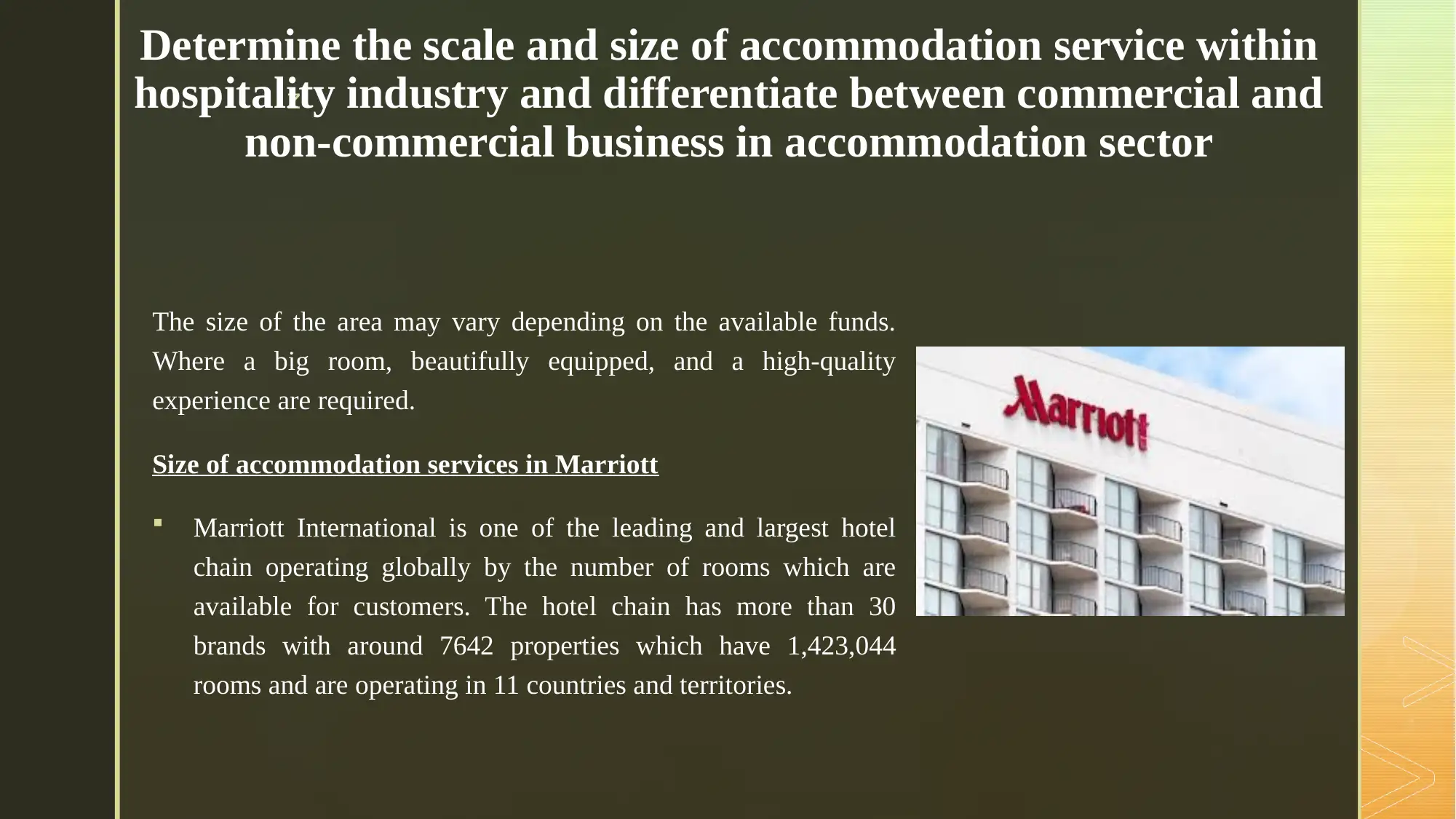
z
Determine the scale and size of accommodation service within
hospitality industry and differentiate between commercial and
non-commercial business in accommodation sector
The size of the area may vary depending on the available funds.
Where a big room, beautifully equipped, and a high-quality
experience are required.
Size of accommodation services in Marriott
Marriott International is one of the leading and largest hotel
chain operating globally by the number of rooms which are
available for customers. The hotel chain has more than 30
brands with around 7642 properties which have 1,423,044
rooms and are operating in 11 countries and territories.
Determine the scale and size of accommodation service within
hospitality industry and differentiate between commercial and
non-commercial business in accommodation sector
The size of the area may vary depending on the available funds.
Where a big room, beautifully equipped, and a high-quality
experience are required.
Size of accommodation services in Marriott
Marriott International is one of the leading and largest hotel
chain operating globally by the number of rooms which are
available for customers. The hotel chain has more than 30
brands with around 7642 properties which have 1,423,044
rooms and are operating in 11 countries and territories.
Paraphrase This Document
Need a fresh take? Get an instant paraphrase of this document with our AI Paraphraser
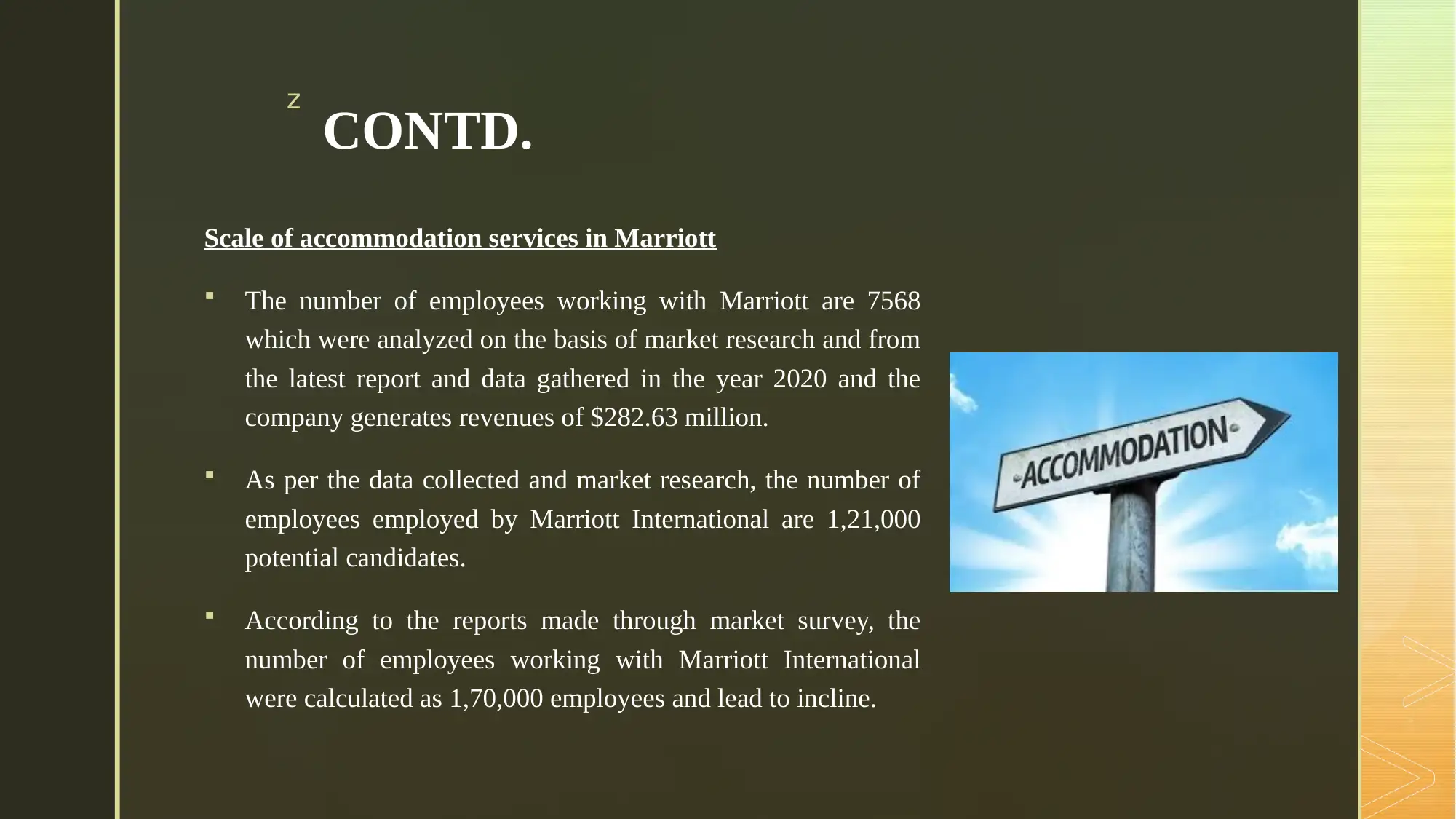
z
CONTD.
Scale of accommodation services in Marriott
The number of employees working with Marriott are 7568
which were analyzed on the basis of market research and from
the latest report and data gathered in the year 2020 and the
company generates revenues of $282.63 million.
As per the data collected and market research, the number of
employees employed by Marriott International are 1,21,000
potential candidates.
According to the reports made through market survey, the
number of employees working with Marriott International
were calculated as 1,70,000 employees and lead to incline.
CONTD.
Scale of accommodation services in Marriott
The number of employees working with Marriott are 7568
which were analyzed on the basis of market research and from
the latest report and data gathered in the year 2020 and the
company generates revenues of $282.63 million.
As per the data collected and market research, the number of
employees employed by Marriott International are 1,21,000
potential candidates.
According to the reports made through market survey, the
number of employees working with Marriott International
were calculated as 1,70,000 employees and lead to incline.
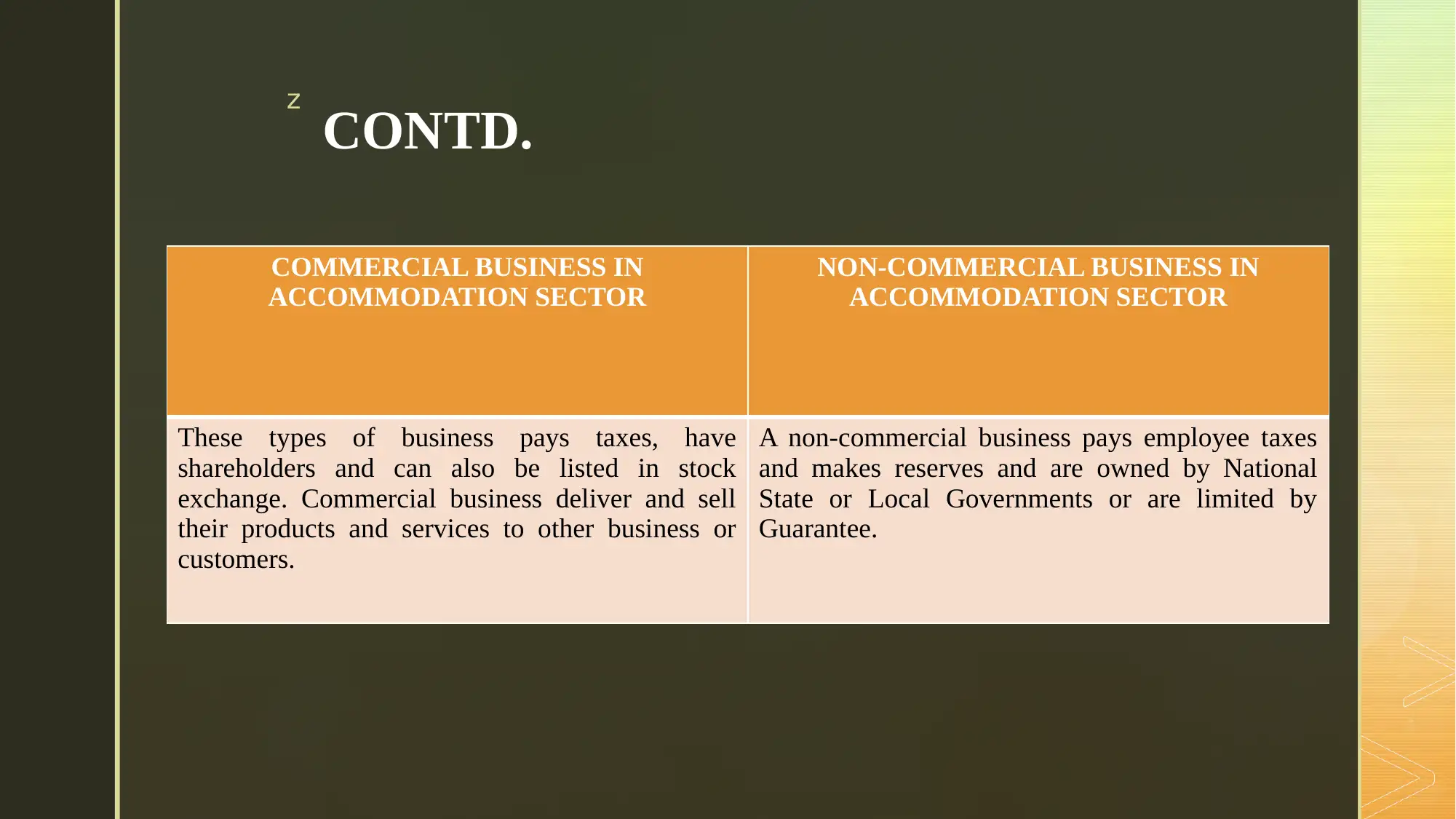
z
CONTD.
COMMERCIAL BUSINESS IN
ACCOMMODATION SECTOR
NON-COMMERCIAL BUSINESS IN
ACCOMMODATION SECTOR
These types of business pays taxes, have
shareholders and can also be listed in stock
exchange. Commercial business deliver and sell
their products and services to other business or
customers.
A non-commercial business pays employee taxes
and makes reserves and are owned by National
State or Local Governments or are limited by
Guarantee.
CONTD.
COMMERCIAL BUSINESS IN
ACCOMMODATION SECTOR
NON-COMMERCIAL BUSINESS IN
ACCOMMODATION SECTOR
These types of business pays taxes, have
shareholders and can also be listed in stock
exchange. Commercial business deliver and sell
their products and services to other business or
customers.
A non-commercial business pays employee taxes
and makes reserves and are owned by National
State or Local Governments or are limited by
Guarantee.
⊘ This is a preview!⊘
Do you want full access?
Subscribe today to unlock all pages.

Trusted by 1+ million students worldwide
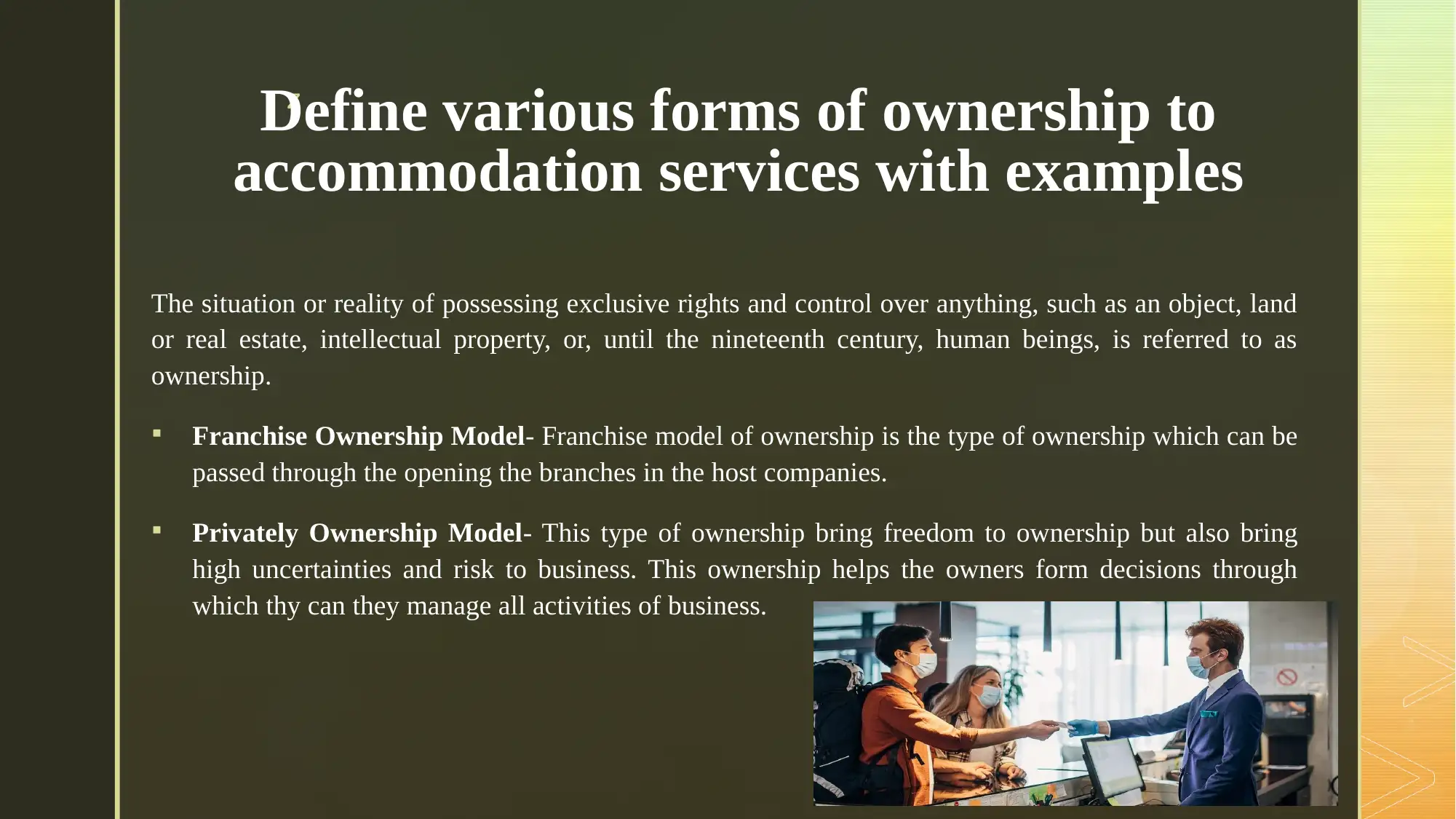
z
Define various forms of ownership to
accommodation services with examples
The situation or reality of possessing exclusive rights and control over anything, such as an object, land
or real estate, intellectual property, or, until the nineteenth century, human beings, is referred to as
ownership.
Franchise Ownership Model- Franchise model of ownership is the type of ownership which can be
passed through the opening the branches in the host companies.
Privately Ownership Model- This type of ownership bring freedom to ownership but also bring
high uncertainties and risk to business. This ownership helps the owners form decisions through
which thy can they manage all activities of business.
Define various forms of ownership to
accommodation services with examples
The situation or reality of possessing exclusive rights and control over anything, such as an object, land
or real estate, intellectual property, or, until the nineteenth century, human beings, is referred to as
ownership.
Franchise Ownership Model- Franchise model of ownership is the type of ownership which can be
passed through the opening the branches in the host companies.
Privately Ownership Model- This type of ownership bring freedom to ownership but also bring
high uncertainties and risk to business. This ownership helps the owners form decisions through
which thy can they manage all activities of business.
Paraphrase This Document
Need a fresh take? Get an instant paraphrase of this document with our AI Paraphraser
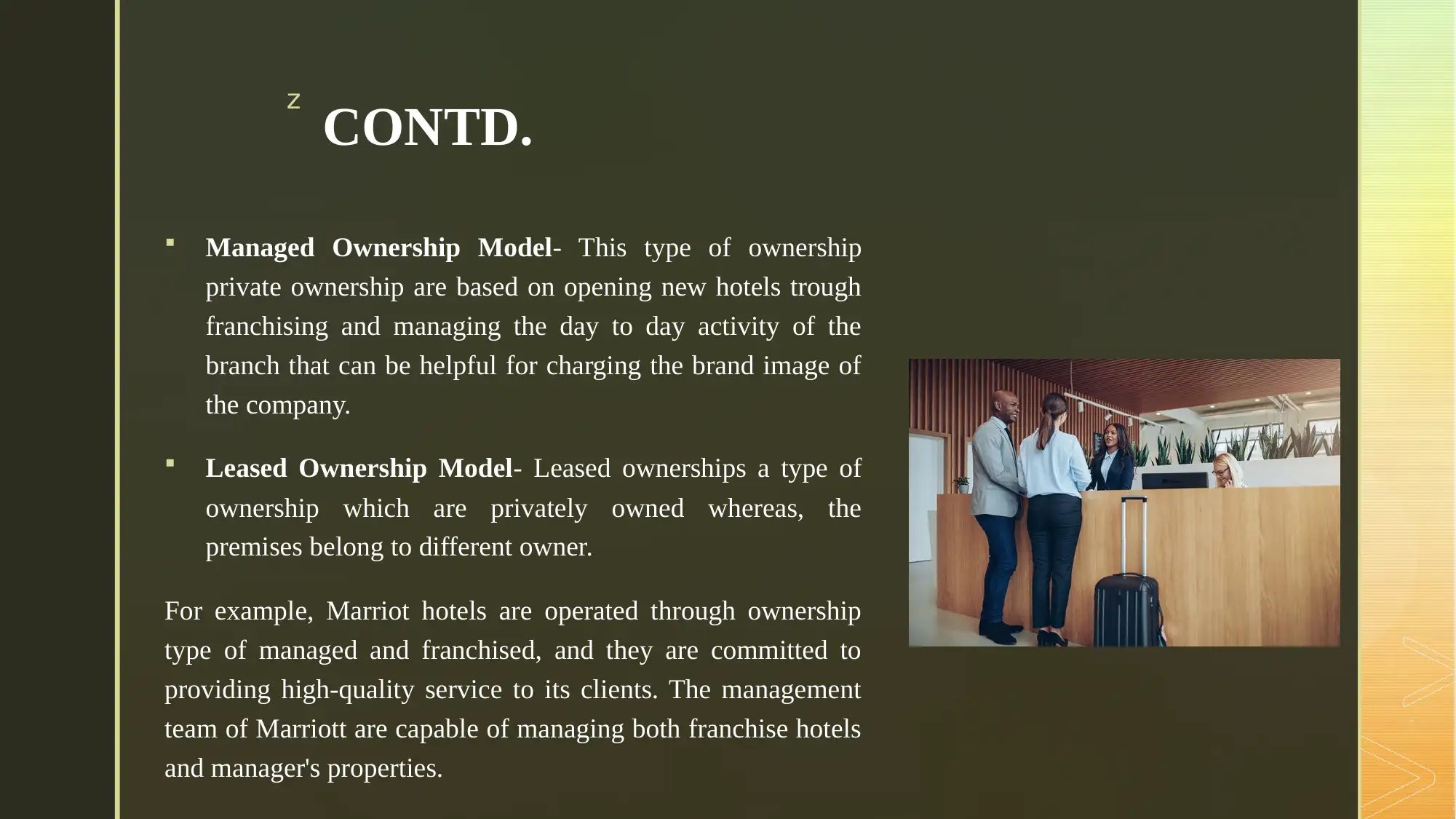
z
CONTD.
Managed Ownership Model- This type of ownership
private ownership are based on opening new hotels trough
franchising and managing the day to day activity of the
branch that can be helpful for charging the brand image of
the company.
Leased Ownership Model- Leased ownerships a type of
ownership which are privately owned whereas, the
premises belong to different owner.
For example, Marriot hotels are operated through ownership
type of managed and franchised, and they are committed to
providing high-quality service to its clients. The management
team of Marriott are capable of managing both franchise hotels
and manager's properties.
CONTD.
Managed Ownership Model- This type of ownership
private ownership are based on opening new hotels trough
franchising and managing the day to day activity of the
branch that can be helpful for charging the brand image of
the company.
Leased Ownership Model- Leased ownerships a type of
ownership which are privately owned whereas, the
premises belong to different owner.
For example, Marriot hotels are operated through ownership
type of managed and franchised, and they are committed to
providing high-quality service to its clients. The management
team of Marriott are capable of managing both franchise hotels
and manager's properties.
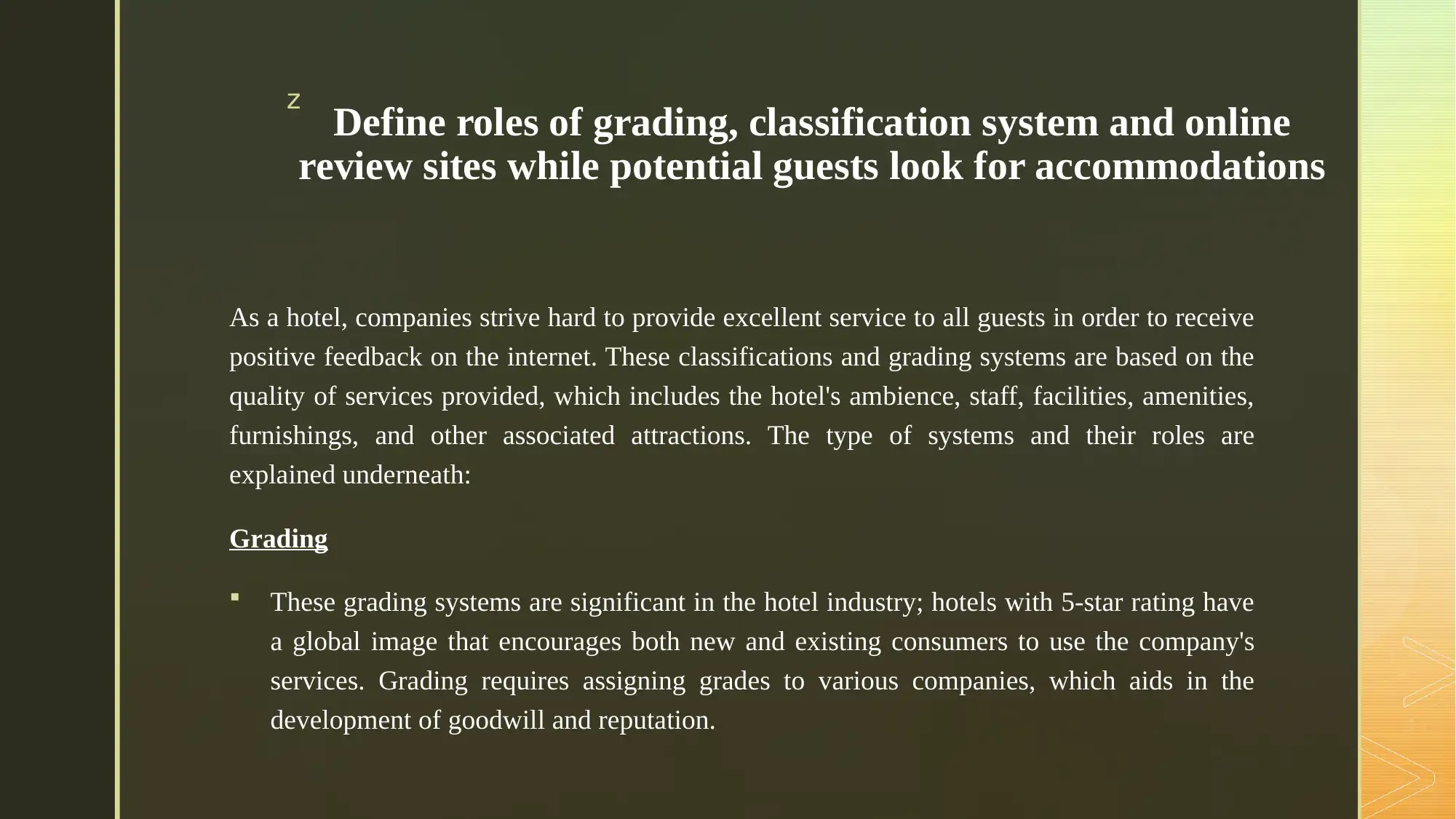
z Define roles of grading, classification system and online
review sites while potential guests look for accommodations
As a hotel, companies strive hard to provide excellent service to all guests in order to receive
positive feedback on the internet. These classifications and grading systems are based on the
quality of services provided, which includes the hotel's ambience, staff, facilities, amenities,
furnishings, and other associated attractions. The type of systems and their roles are
explained underneath:
Grading
These grading systems are significant in the hotel industry; hotels with 5-star rating have
a global image that encourages both new and existing consumers to use the company's
services. Grading requires assigning grades to various companies, which aids in the
development of goodwill and reputation.
review sites while potential guests look for accommodations
As a hotel, companies strive hard to provide excellent service to all guests in order to receive
positive feedback on the internet. These classifications and grading systems are based on the
quality of services provided, which includes the hotel's ambience, staff, facilities, amenities,
furnishings, and other associated attractions. The type of systems and their roles are
explained underneath:
Grading
These grading systems are significant in the hotel industry; hotels with 5-star rating have
a global image that encourages both new and existing consumers to use the company's
services. Grading requires assigning grades to various companies, which aids in the
development of goodwill and reputation.
⊘ This is a preview!⊘
Do you want full access?
Subscribe today to unlock all pages.

Trusted by 1+ million students worldwide
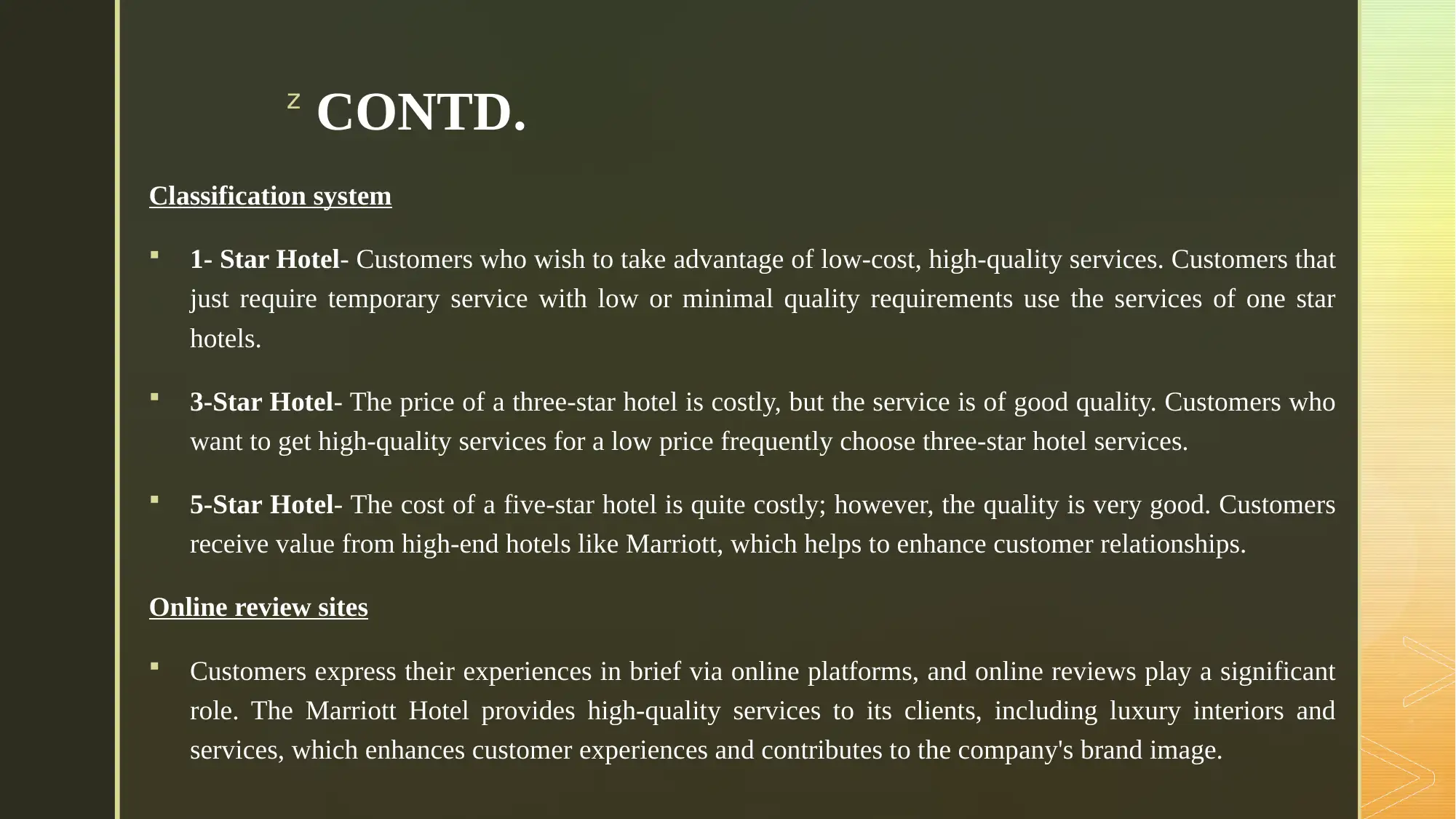
z CONTD.
Classification system
1- Star Hotel- Customers who wish to take advantage of low-cost, high-quality services. Customers that
just require temporary service with low or minimal quality requirements use the services of one star
hotels.
3-Star Hotel- The price of a three-star hotel is costly, but the service is of good quality. Customers who
want to get high-quality services for a low price frequently choose three-star hotel services.
5-Star Hotel- The cost of a five-star hotel is quite costly; however, the quality is very good. Customers
receive value from high-end hotels like Marriott, which helps to enhance customer relationships.
Online review sites
Customers express their experiences in brief via online platforms, and online reviews play a significant
role. The Marriott Hotel provides high-quality services to its clients, including luxury interiors and
services, which enhances customer experiences and contributes to the company's brand image.
Classification system
1- Star Hotel- Customers who wish to take advantage of low-cost, high-quality services. Customers that
just require temporary service with low or minimal quality requirements use the services of one star
hotels.
3-Star Hotel- The price of a three-star hotel is costly, but the service is of good quality. Customers who
want to get high-quality services for a low price frequently choose three-star hotel services.
5-Star Hotel- The cost of a five-star hotel is quite costly; however, the quality is very good. Customers
receive value from high-end hotels like Marriott, which helps to enhance customer relationships.
Online review sites
Customers express their experiences in brief via online platforms, and online reviews play a significant
role. The Marriott Hotel provides high-quality services to its clients, including luxury interiors and
services, which enhances customer experiences and contributes to the company's brand image.
Paraphrase This Document
Need a fresh take? Get an instant paraphrase of this document with our AI Paraphraser
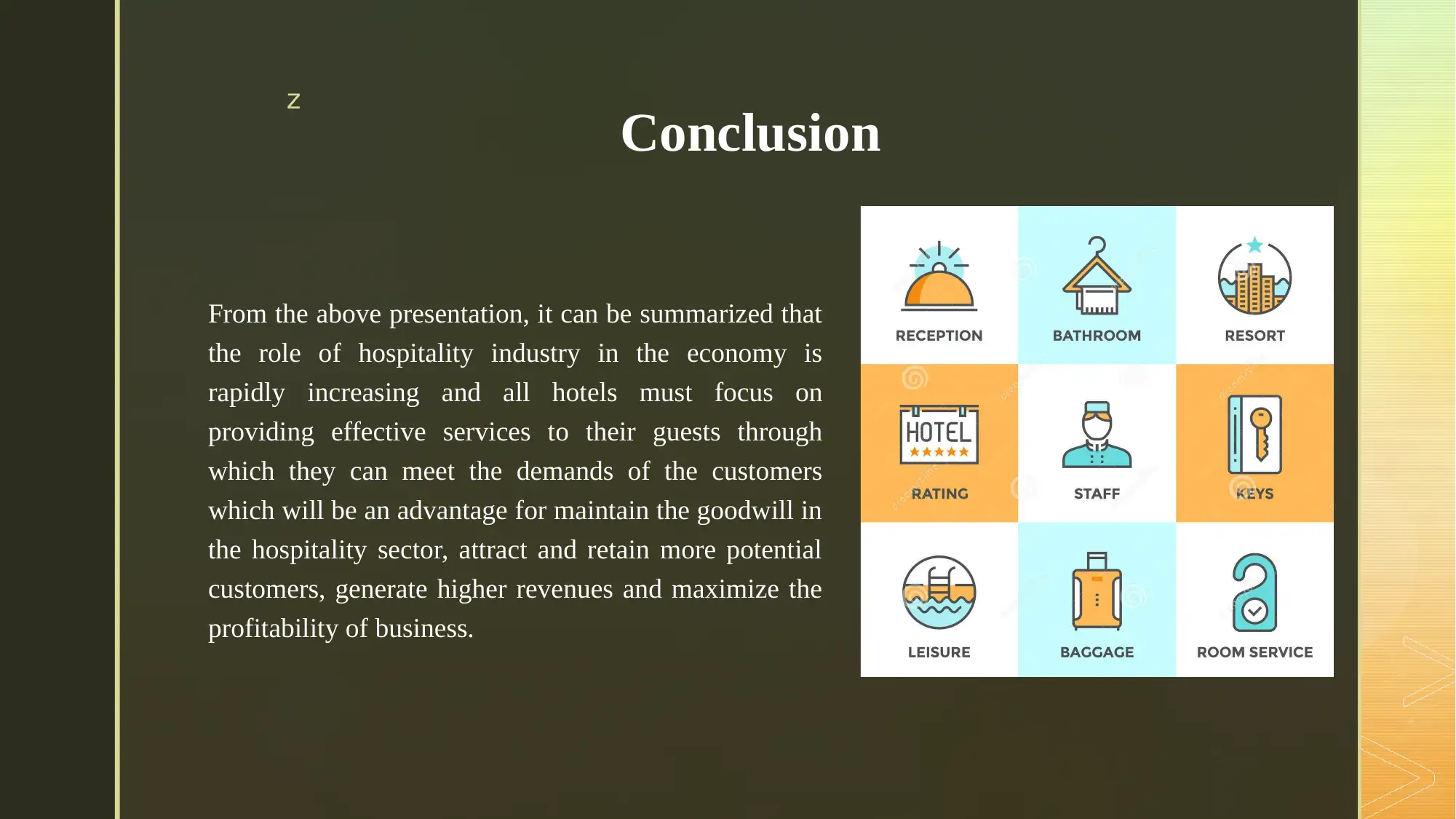
z
Conclusion
From the above presentation, it can be summarized that
the role of hospitality industry in the economy is
rapidly increasing and all hotels must focus on
providing effective services to their guests through
which they can meet the demands of the customers
which will be an advantage for maintain the goodwill in
the hospitality sector, attract and retain more potential
customers, generate higher revenues and maximize the
profitability of business.
Conclusion
From the above presentation, it can be summarized that
the role of hospitality industry in the economy is
rapidly increasing and all hotels must focus on
providing effective services to their guests through
which they can meet the demands of the customers
which will be an advantage for maintain the goodwill in
the hospitality sector, attract and retain more potential
customers, generate higher revenues and maximize the
profitability of business.
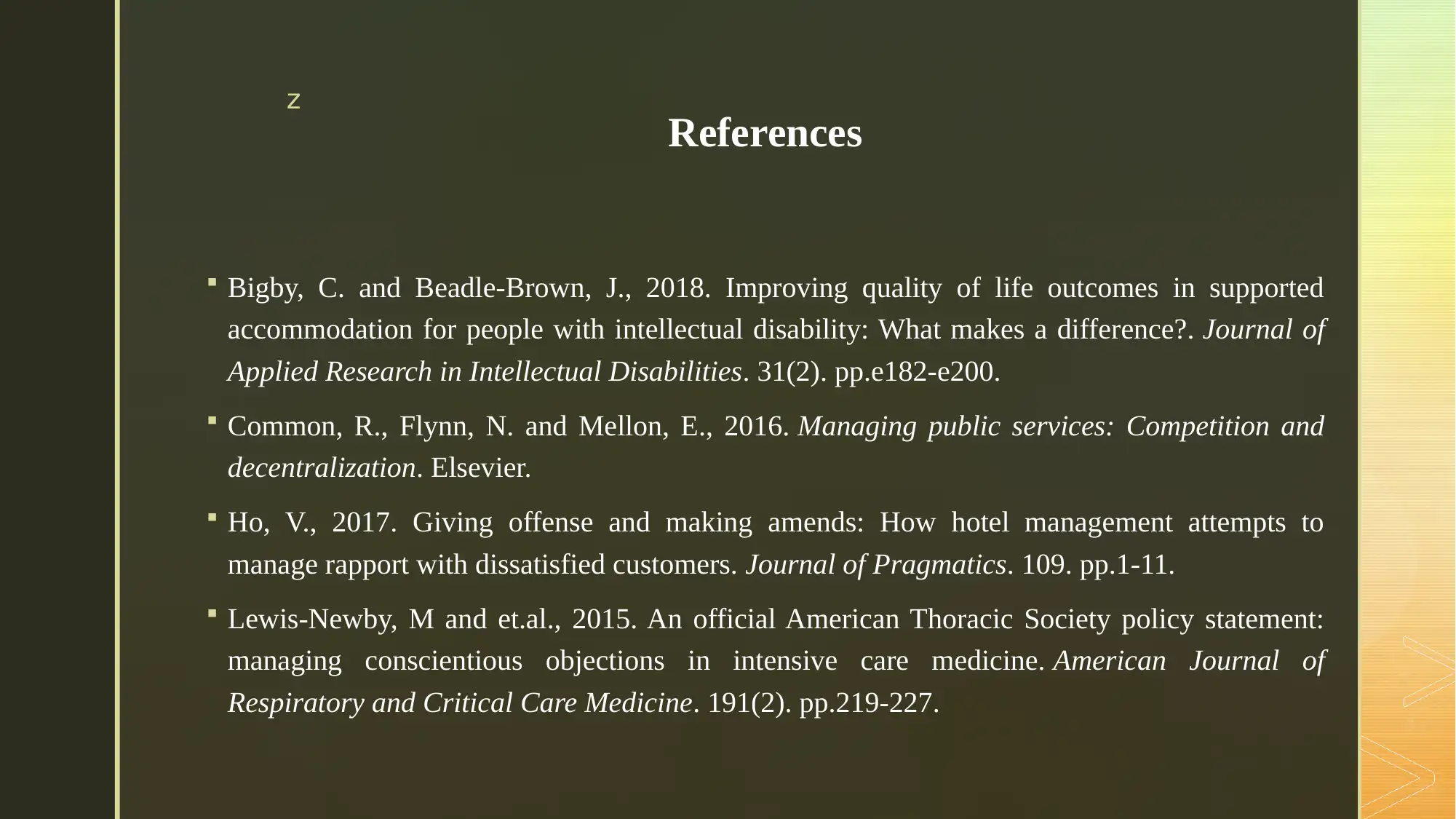
z
References
Bigby, C. and Beadle‐Brown, J., 2018. Improving quality of life outcomes in supported
accommodation for people with intellectual disability: What makes a difference?. Journal of
Applied Research in Intellectual Disabilities. 31(2). pp.e182-e200.
Common, R., Flynn, N. and Mellon, E., 2016. Managing public services: Competition and
decentralization. Elsevier.
Ho, V., 2017. Giving offense and making amends: How hotel management attempts to
manage rapport with dissatisfied customers. Journal of Pragmatics. 109. pp.1-11.
Lewis-Newby, M and et.al., 2015. An official American Thoracic Society policy statement:
managing conscientious objections in intensive care medicine. American Journal of
Respiratory and Critical Care Medicine. 191(2). pp.219-227.
References
Bigby, C. and Beadle‐Brown, J., 2018. Improving quality of life outcomes in supported
accommodation for people with intellectual disability: What makes a difference?. Journal of
Applied Research in Intellectual Disabilities. 31(2). pp.e182-e200.
Common, R., Flynn, N. and Mellon, E., 2016. Managing public services: Competition and
decentralization. Elsevier.
Ho, V., 2017. Giving offense and making amends: How hotel management attempts to
manage rapport with dissatisfied customers. Journal of Pragmatics. 109. pp.1-11.
Lewis-Newby, M and et.al., 2015. An official American Thoracic Society policy statement:
managing conscientious objections in intensive care medicine. American Journal of
Respiratory and Critical Care Medicine. 191(2). pp.219-227.
⊘ This is a preview!⊘
Do you want full access?
Subscribe today to unlock all pages.

Trusted by 1+ million students worldwide
1 out of 12